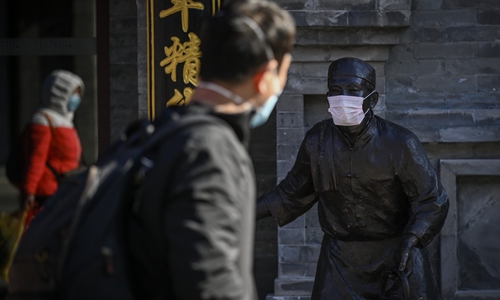HOME >> CHINA
Children of a Danish diplomat warned for breaking quarantine rules
By Liu Caiyu and Zhang Hui Source:Global Times Published: 2020/3/27 16:06:50

A bronze statue (R) wearing a face mask is seen at the entrance of a shop along a business street in Beijing. Photo: AFP
Local community officers warned the children of a Danish diplomat in China for not wearing face masks while walking their dogs during the quarantine period in its residential community in Beijing recently, amid recent public criticism over "super-national treatment" to foreigners who were under quarantine in China.
Foreigners' defiance of quarantine rules and local communities' exceptional treatment to them worries many Chinese residents as China, which is in a fight against the spread of COVID-19, faces mounting pressure posed by imported infections that may result in a second wave of the deadly coronavirus.
Three children, two boys and a girl, of a counselor of the Danish Embassy who are still under a 14-day home quarantine, were caught walking dogs on March 25 by their neighbors, reports said.
The diplomat had not left China but the three children returned from Denmark to Beijing on March 13, which means they should quarantine at home for at least 14 days before going outside, a community officer at Wanguocheng community in Dongzhimen, a central area of Beijing, told Beijing News on Friday.
"We had also contacted the foreign affairs department regarding the issue. The Danish embassy and the diplomat promised that they won't go out during the quarantine period," the community officer said.
The Danish Embassy said when reached by the Global Times they cannot comment on specific topics, but all staff members of the embassy need to follow rules of the local government.
Since they broke quarantine rules, whether they will face another 14 days of quarantine is unknown.
Many Chinese netizens criticized their disdain of Chinese laws, and while everyone else is following epidemic prevention rules, diplomats should not be exempted.
Diplomats enjoy certain diplomatic immunities but it does not include the privilege of breaking Chinese laws and regulations, and not complying with epidemic prevention measures during a public health crisis, Wang Hongwei, a professor at Renmin University of China's School of Public Administration and Policy, told the Global Times on Friday.
Diplomats who insist on doing so should be forcibly stopped, and those who continue to fail to cooperate with authorities should be deported, some people suggested.
Recently, the Chinese public showed growing discontent over what some netizens call "super-national treatment" to foreigners who are under quarantine in China, as domestic media have been reporting that foreigners living in China's communities were given "warm-hearted" care.
On Friday, a report saying a community committee in Nanjing, East China's Jiangsu Province, had its employees carry fresh bread and barrels of purified water and some 20 deliveries to the doors of foreigners in the community every day outraged many Chinese netizens, despite the community committee's response that they would provide the same service to Chinese residents.
Nanjing's story came several days after reports of a British man who came back to Shanghai after traveling abroad and refused to go to a designated quarantine facility was given an agreement by his community to practice home quarantine while asking his wife and toddler to leave their apartment.
The story triggered widespread anger among the Chinese public who criticized the community for catering to foreigners unconditionally and allowing foreigners to act above the quarantine rules.
An online poll on netizens' attitude toward the treatment of foreigners under quarantine in China on news site 163.com showed that more than 4,000 of 4,500 respondents said they believe Chinese and foreigners are treated differently and the behavior in the Nanjing community really broke Chinese people's heart.
Experts said that it's understandable that foreigners as guests living in China should be given more care, but such care cannot conflict with regulations and rules.
Chinese and foreigners should be given equal treatment especially on prevention and control of COVID-19, as making exceptions to foreigners may pose a threat to the overall domestic COVID-19 battle that has seen great achievements, analysts warned.
However, some foreigners living in China expressed concerns that they are being discriminated against. In response, Geng Shuang, spokesperson of China's Foreign Ministry said at Friday's media briefing that what he heard more were foreigners' admiration and praise for China's achievements in fighting the COVID-19 in such a short time.
Geng said China always attaches great importance to the health and safety of foreign nationals in China and protects their legal rights. China opposes all forms of discrimination, and Chinese and foreigners are treated equally in terms of quarantine policies and other COVID-19 prevention and control measures.
Newspaper headline: 'Super-national treatment' draws public ire